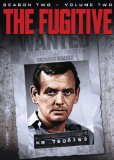| Reviews & Columns |
|
Reviews DVD TV on DVD Blu-ray 4K UHD International DVDs In Theaters Reviews by Studio Video Games Features Collector Series DVDs Easter Egg Database Interviews DVD Talk Radio Feature Articles Columns Anime Talk DVD Savant Horror DVDs The M.O.D. Squad Art House HD Talk Silent DVD
|
DVD Talk Forum |
|
|
| Resources |
|
DVD Price Search Customer Service #'s RCE Info Links |
|
Columns
|
|
|
Fugitive - Season Two, Volume Two, The
Author's note: As regular consumers of TV on DVD know, the marketing gimmick of splitting up complete seasons of vintage TV series into two separately released volumes has become, regrettably, an increasingly common practice. Having written an in-depth review of The Fugitive: Season Two, Volume One last June, and since stylistically and aesthetically, there is no difference between the first and second half of that particular 1964-1965 season, I've rewritten my original review of that season to cover this Volume Two release - with additional commentary added at the end, discussing specific episodes from this set.
On a far more important note, as many consumers of vintage TV already know, a major controversy erupted with Paramount's release of the first volume of The Fugitive's second season, because series composer Pete Rugolo's underscores for those episodes were eliminated and replaced with new music cues. That evocative opening and closing theme was retained, but everything else by Rugolo, apparently, was replaced (along with the other library cues that made up the original underscores). I missed that substitution, as did several other online reviewers, and I was informed about it in no uncertain terms, in both a friendly (the majority of people who emailed) and not so friendly manner (apparently, innocently labeling myself a "Fugitive fanatic" was the wrong choice of words for a few who take this series and this controversy very seriously). Although I'm not sure if there's been an official reason released by Paramount accounting for these substitutions, my feeling at the time, along with others, was that legal complications involving music rights were involved. But again, so far, there's been no official statement by the studio to put the controversy to rest. What I can state is that there are still music substitutions here in this second volume of episodes (pal, you better believe I was listening closely this go-around). It doesn't appear to be nearly as pervasive - if I had to guess, I'd say much more than less of Rugolo's underscore remains. Again, I'm no music expert, but the substitutions do become more obvious and noticeable when they're mixed in with the original Rugolo music (I'll leave it to the Fugitive music cue experts to count the seconds). Why Paramount did this mixture is again, subject to conjecture. Did they originally replace the entire score (as they did with the first volume), and put most of the Rugolo cues back in after the controversy? Or was there a problem with just those first episodes? I don't know. And I don't think anyone else does for certain, either. But considering the (relative) magnitude of the controversy, these continued music substitutions here should be noted.
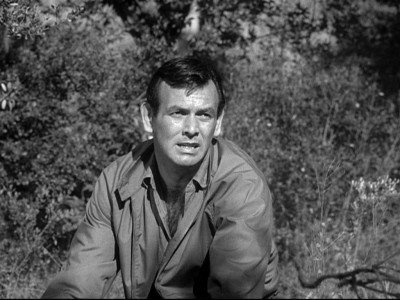
September 15, 1964: The day the running continued.
"The Fugitive. A QM production. Starring David Janssen as Dr. Richard Kimble. An innocent victim of blind justice, falsely convicted for the murder of his wife; reprieved by fate when a train wreck freed him en route to the death house. Freed him to hide in lonely desperation, to change his identity, to toil at many jobs. Freed him to search for a one-armed man he saw leave the scene of the crime. Freed him to run before the relentless pursuit of the police lieutenant obsessed with his capture."
The second year of running. The second year of hiding, of sleepless nights and back-breaking days. The second year of the never-ending nightmare that is Dr. Richard Kimble's life. CBS Video and Paramount have released The Fugitive: Season Two, Volume Two, another annoying split-season offering of 15 episodes spread over four discs, of the single best drama anthology of the 1960s. Starring David Janssen as Richard Kimble, The Fugitive: Season Two, Volume Two continues its brilliant mixture of closely-observed character study melded to the action drama anthology, producing 15 hour-long stories that play as well today as they did 34 years ago (perhaps even better, considering the dreck that passes for TV drama today). It's one of the few must-have vintage TV DVD releases so far this year.
I wrote extensively on the mythos, the sociological impact, and the aesthetic structure of The Fugitive in my previous two reviews of the show, so I won't retread too deeply into the show's powerful construction (please click here to read those in-depth reviews for background on the series). For those new to the series, The Fugitive is loosely based on a combination of the Victor Hugo novel, Les Miserables and the infamous Dr. Sam Sheppard murder case, following the harrowing plight of convicted wife-murderer Dr. Richard Kimble of Stafford, Indiana. Falsely accused, tried and found guilty of a crime he didn't commit, Dr. Kimble narrowly cheats death when the train carrying him and Lieutenant Detective Gerard (Barry Morse) derails. Kimble escapes, and has been on the run for the past two years, with the grim, relentless, brilliant Gerard breathing down his neck at every turn in the road. Gerard vows to bring in Kimble no matter what his own personal feelings are concerning Kimble's innocence or guilt, while Kimble vows to keep running at all costs until he can find the one-armed man he saw leaving the vicinity of his home on the night of his wife's murder. Finding temporary help - and hindrance - from people he encounters all over the country, Kimble has changed his appearance and toils in menial jobs, following the slimmest of clues concerning his prey, while trying to eke out a pathetic existence of loneliness and despair, sure that at every turn he's going to be captured and returned to the death house before finding the infamous one-armed man - the only chance he has of clearing his name
Watching the rest of Season Two (a disjointed effort because of the studios' continued annoying insistence on these split-season releases), I tried to put my finger on what was different from the first 30 episodes of Season One. Obviously, the opening credit sequence has been changed, with a new spoken intro (reprinted above) played over a montage of still shots from various Season One and Two episodes (as well, a brief one-sequence clip from the upcoming episode is shown as a teaser for what the viewer is going to watch). Listening to that new opening, it dawned on me that it's much faster, much more curt and to the point, with a greater sense of urgency and anticipated excitement - while perhaps eliminating some of the more powerful poetry of the first season's spoken intro (I dearly miss my favorite line, "But in that darkness, Fate moves its huge hand."). And that may be a good way to approach these last 15 episodes of The Fugitive: Season Two, Volume Two. Perhaps a little bit of the poetry of the piece has been muted in favor of a faster tone, a quicker pace. The established concept, so new to viewers back in the fall of 1963, had by now sunk in with the audience, and now it was time to move. Action sequences pop up with more frequency this second season, and even in the more dialogue-driven shows, the feeling is one of economy married to an atmosphere of increased pressure on the Kimble character. While many episodes in Season One had an almost elegiac, wandering feeling to Kimble's adventures, The Fugitive: Season Two, Volume Two has Kimble escaping from one narrow miss after another, with hardly a moment to let the character rest or settle down.
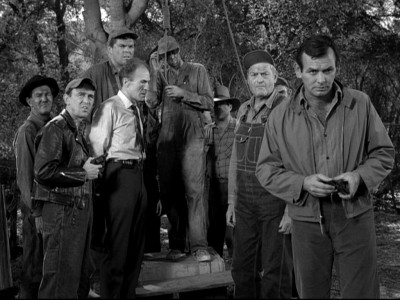
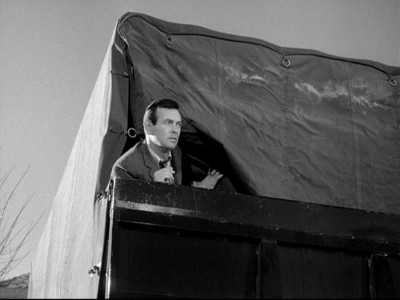
David Janssen seems different, as well, as the harassed Kimble. With the pace of the episodes sped up, Kimble has less time to be "tortured" by the memory of his dead wife, or to wallow in any self-pity or even self-doubt. The season-opening episode, Man in a Chariot is a good example of this gradual transformation of the Kimble character. Believing that a once-famous attorney (the magnificent Ed Begley) can get him a successful re-trial, Kimble arrives at his office and meets one of the series' standard supporting characters: a secretary (Kathleen Maguire) who loves the disabled attorney and who wants to protect him against any harm that Kimble may bring to his career and reputation. If the viewer is familiar with previous Fugitive episodes, one expects Kimble to be cautiously deferential to the secretary - a defense mechanism that Kimble utilized in the first season to get himself out of jams (Kimble's good Midwestern breeding was often his curse - people always knew he was too educated and kind to be a shiftless drifter - and his salvation, with women immediately trusting him because of his kind manner). But surprisingly, here Kimble is gruff, sarcastic, even dismissive of the secretary. He's obviously annoyed with her interference and he has no qualms in showing it. Why has he changed?
He changed, because he has been running for almost two years. The stress and strain of continual escape, of never being able to rest his suspicions and fears for a second, have obviously taken a toll on Kimble (in the excellent A.P.B., Kimble upbraids Shirley Knight about how easily normal people can be turned into "animals" due to their circumstances - a transformative feeling Kimble fights against constantly). Perhaps even more to the point, this Kimble, almost two years after hitting the roads of a dysfunctional America, is a tough, ballsy survivor. He's more confident in his escapes, more confident in his moves to avoid various deputies, flatfoots and well-and-ill-meaning civilians out to either aid his escape, or bag him for the cops. This Kimble of Season Two, increasingly, understands what he has to do to survive, and what's needed to escape at a moment's notice. The kindly, deferential, hoping-to-be-invisible Kimble is rapidly morphing into the tough-as-nails hardcase who can negotiate just about any situation - even if it means breaking the law a little bit. In other words, in supreme irony considering the original concept of the show (and indicative of the continued artistic worth of the series), the producers, writers and Janssen are slowly moving Kimble closer to the criminals he initially abhorred, and whom Kimble thought himself separate from - and above. It's an exhilarating change for the character, and one that continues through these last set of episodes
Equally smart (and nicely self-reflexive) are the writers taking into account that Kimble is going to be recognized more quickly as time drags on. More and more people see his wanted posters as the dragnet continues. The use of television in the hunt has reached more people; almost nobody is fooled by Kimble's "disguise" anymore (dyed and differently styled hair). Recognition comes almost immediately to law enforcement officials who ponder where they've seen Kimble, before they go off and search their wanted posters. This continued plot element not only speeds up the episodes, it serves as a nice link to the audience watching The Fugitive, who followed this show like no other show before (and perhaps since). Each week, as the viewers were exposed to one close-shave after another for Kimble, they became more savvy - and they expected Kimble to evolve as well (along with his tormentors). Kimble is, by any definition, a celebrity (both within the series and outside in the audiences' experience of it), and that's accurately reflected in Kimble's increased difficulties in getting even a moment's peace.
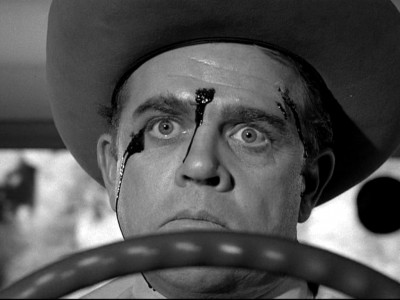
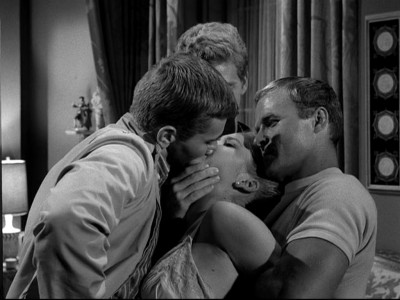
With the exception of one or two missteps, the episodes of The Fugitive: Season Two, Volume Two continue this new ever-tightening noose suspense angle, and quite effectively. I can't say that Corner of Hell is one of the best Fugitive episodes I've seen, although the cast is excellent (Bruce Dern, the always great R.G. Armstrong, Sharon Farrell) and the action is exciting (I'm always a sucker for the "Yankee-caught-by-the-moonshinin'-hillbillies" subgenre). Written by Jo Helms and Francis Irby Gwaltney, Corner of Hell strains the credibility of the format by trying too hard to have Gerard experience precisely what Kimble is going through: sentenced to death for a crime he didn't commit. It screams "IRONY" in big block letters with a format that already lends itself continuously to that concept. And while Morse is solid as always, the rigid characterization of Gerard here doesn't come off admirably (he could have at least said, "thanks for saving my life" before warning Kimble he's still coming after him), something that other episodes managed to get across: that Gerard, for all his stubbornness, was, after all, just doing his job and following the letter of the law (the episode does have an interesting take on law and justice, as seen from a particular community's perspective, though). And The Old Man Picked a Lemon, again notwithstanding the excellent supporting players (Celeste Holm is quite good), seems a bit of a stretch for the concept, with Kimble sticking around far too long in a situation that smells bad right from the start, in order for the inevitable to happen: he's fingered by someone and then toyed with to further that person's aims.
However, those two episodes, even with their flaws, still manage to deliver some excitement, while the rest of the offerings here are up to The Fugitive's usual superior standards. Nicest Fella You'd Ever Want To Meet is one of the series' best, with guest star Pat Hingle creating perhaps Kimble's most heinous adversary, while the screenwriter explores some of the more unseemly angles of small town America (the blatant back-scratching between the Sheriff and the Mayor is accepted as natural). Starkly shot by Sutton Roley, Nicest Fella You'd Ever Want to Meet has a beautifully harsh visual design that compliments Hingle's sinister, blowhard murderous sheriff (Roley's inserts of a bloodied, wide-eyed staring Hingle driving his car as he mows down Tom Skerritt are a wild sight at two in the morning). Angie Dickinson turns in a typically erotic performance (and a good one, too, for this underrated actress) in Brass Ring, where she plots to kill her invalid brother, Robert Duvall (in a typically excellent performance, as well). Fun and Games and Party Favors finds Kimble yet again serving the rich, this time as a chauffeur and gateman to a wealthy L.A. family. Director Abner Biberman's depiction of the almost-rape of Katherine Crawford (Fugitive creator Roy Huggins' daughter) is fairly graphic for 1965 TV standards (the shot of the three men holding her is more than suggestive), while the subtext of Tom Palmer's rejection of his social climber wife's machinations is an interesting foreshadowing of the coming change in the public's perceptions about what exactly constitutes "success." This coming change in "the times" is also obliquely hinted at in Runner in the Dark, a smashing episode starring the brilliant Ed Begley as a blind sheriff tossed aside for "college boy" lawman, Richard Anderson. A typically exciting entry directed by series vet Alexander Singer, Runner in the Dark ostensibly offers up a quintessential Fugitive set-up (Kimble, seeking refuge from the police, finds himself further squeezed by his personal entanglements with the people he encounters, among them someone who will exploit his trouble for their own personal gain), but its subtext suggests elements like hard-earned experience and old-fashioned ways of doing things are rapidly being replaced - and unsentimentally so (Begley's humiliation at the end of the episode, when he's duped relatively easily by Kimble, is complete).
The Survivors, written by George Eckstein and director by Fugitive vet Don Medford, manages to exploit a similar framework of Kimble trapped in a home quite well, when Kimble decides (rather foolhardedly) to return to his wife's hometown of Fairgreen, Indiana to help out his financially-strapped father-in-law (and how cool is it to see Kimble wearing his Ray-Ban Wayfarers during an entire extended chase sequence?). Ruth White etches a convincing portrait of a mother unable not to hate the son-in-law convicted of killing her daughter, while director Medford works out a convincing number of believable action set-ups of Kimble dodging in and out of the house, always one step ahead of the cops. Everybody Gets Hit in the Mouth Sometime (what a great title!), written by Jack Turley and directed by Singer, must have been viewed by TV-obsessed Steven Spielberg when he was young (the truck chase shots could be outtakes from Duel), while Jack Klugman tears up the scenery in a great turn as a perpetually pissed-off trucking company owner. May God Have Mercy may press the "Hey! I lived in the same town as Kimble!" plot tactic a little too far (the coincidences are a little hard to take), but we do get to see Telly Savalas in his prime (before he turned so hammy) and Carol Rossen giving another memorable performance (one of the coups of The Fugitive series was the superlative casting). A.P.B., another personal series favorite, has a super-weird vibe to it right from the start, a feeling that gets progressively creepier as Shirley Knight deliberately turns on potential rapist Lou Antonio because she's never known an "exciting man." Paul Richards has a nice turn here as an educated convict who turns out to be more of an "animal" than the outwardly animalistic Antonio. And the season finale, Last Second Of a Big Dream, although set in a too-familiar setting (JungleLand seemed to pop up in other series around this time, as well, including a memorable Route 66 episode), is an exciting episode (with Steve Forrest and Laurence Naismith giving good accountings of themselves) that distills down the very zeitgeist of The Fugitive perfectly in one visual: Kimble, locked in a cage like an animal for public viewing, by a desperate zoo owner hoping to make a buck off his capture. I'm not sure if the series ever was able to crystalize the series' theme so succinctly again, but we have two more upcoming seasons to find out.
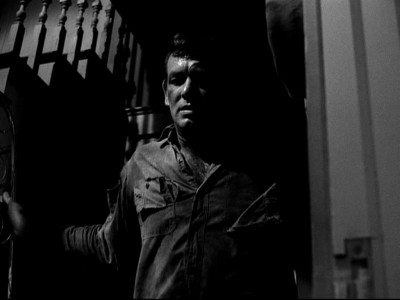
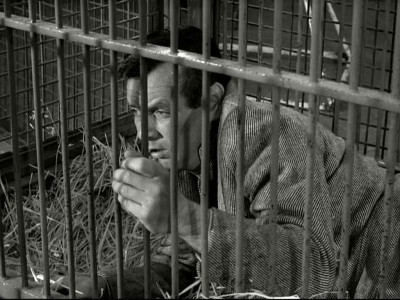
Here are the 15, one-hour episodes of the four-disc box set The Fugitive: Season Two, Volume Two, as described on its insert. PLEASE NOTE: As with most vintage TV series released by CBS/Paramount, there is a small disclaimer (smaller than normal, actually, with no prominent border box for this one) at the back of the DVD slimcase that states, "Some episodes may be edited from their original network versions. Music has been changed for this home entertainment version." There is no further explanation of what cuts, if any, were made. Most of the episodes time out at around 51 and a half minutes, which is about right or close for the original network run times. It's possible, though, that these are the syndicated versions, which may account for the minor cuts for time. As well, music licensing fees are exorbitant for vintage TV, with most studios opting for simply replacing expensive music cues with music either in their domain, or generically produced specifically for those replacement cues (see discussion above):
DISC ONE
Brass Ring (January 5, 1965)
Alias: Ben Horton.
Occupation: Care giver.
Location: Santa Monica, California.
Guest Stars: Angie Dickinson, Robert Duvall, John Ericson, Karl Swenson
Richard Kimble is hired to work in a shop on the Santa Monica Pier, caring for a rich invalid. But then he falls for the man's beautiful but scheming sister.
The End is But the Beginning (January 12, 1965)
Alias: Steve Younger
Occupation: Truck driver.
Location: Near Coverton.
Guest Stars: Barbara Barrie, Andrew Duggan, Frank Maxwell, Paul Birch.
After Kimble picks up a hitchhiker, they have a deadly accident. Now he plans to pass off the passenger's corpse as his own, and a lonely woman agrees to help.
Nicest Fella You'd Ever Want to Meet (January 19, 1965)
Alias: Richard Clark.
Occupation: No occupation - on the run.
Location: Bixton, Arizona.
Guest Stars: Pat Hingle, Dabney Coleman, Tom Skerritt, Curt Conway, Mary Murphy, Dabbs Greer, Burt Mustin.
An Arizona sheriff is great with kids, and is even building a park for his town. But then he murders one of his prisoners, and the only witness is Richard Kimble.
Fun and Games and Party Favors (January 26, 1965)
Alias: Douglas Beckett.
Occupation: Chauffeur / Gateman.
Location: Los Angeles, California.
Guest Stars: Katherine Crawford, Mark Goddard, Joan Tompkins, Anthony Call, Peter Duel.
As a family's chauffeur, Kimble must also chaperone their daughter's party. But then a crime buff crashes the soiree - armed with Kimble's wanted poster.
DISC TWO
Scapegoat (February 2, 1965)
Alias: Bill Hayes / Eddie Fay.
Occupation: Construction worker.
Location: Black River County.
Guest Stars: Dianne Foster, John Anderson, Harry Townes, Don Quine, Whit Bissell.
Kimble discovers there was a trial in a previous town that proved that he was dead. And now an innocent man is being held for his "murder."
Corner of Hell (February 9, 1965)
Alias: Paul Hunter.
Occupation: Relief truck driver.
Location: Waterton, Moss Junction, 'Shine Country.
Guest Stars: R.G. Armstrong, Bruce Dern, Sharon Farrell, Dabbs Greer.
Lt. Philip Gerard finds himself pursued - by a gang of backwoods moonshiners - after he follows Richard Kimble into a nightmarish community.
Moon Child (February 16, 1965)
Alias: Bill Martin.
Occupation: No occupation - on the run.
Location: No location given.
Guest Stars: Murray Hamilton, June Harding, David Sheiner, Harry Dean Stanton, Val Avery.
When a small-town vigilante group thinks Kimble may be the local strangler, an emotionally disturbed girl he befriended hides him in her basement.
The Survivors (March 2, 1965)
Alias: No alias.
Occupation: No occupation - on the run.
Location: Fairgreen, Indiana.
Guest Stars: Ruth White, Louise Sorel, Lloyd Gough, Richard Devon, Burt Metcalfe.
Kimble finds out his former father-in-law had a financial setback, so he goes to the home where his late wife grew up - only to face her grieving mother.

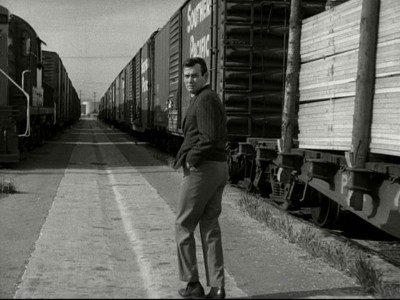
DISC THREE
Everybody Gets Hit in the Mouth Sometime (March 9, 1965)
Alias: Bill Douglas.
Occupation: Trucking company dispatcher.
Location: Colorado.
Guest Stars: Jack Klugman, Geraldine Brooks, Michael Constantine.
Kimble's boss at a trucking company is being blackmailed by the widow of one of his drivers. So he plans to hijack one of his own trucks to collect the insurance.
May God Have Mercy (March 16, 1965)
Alias: Harry Reynolds.
Occupation: Hospital orderly.
Location: Michigan.
Guest Stars: Telly Savalas, Carol Rossen, Norman Fell, Jud Taylor.
At a hospital, Kimble is recognized by a man who holds him responsible for the death of his daughter. So why is he now confessing to Kimble's crime?
Masquerade (March 23, 1965)
Alias: Leonard Hull.
Occupation: No occupation - on the run.
Location: Clay City.
Guest Stars: Norma Crane, Edward Asner, John Milford, James Doohan.
When a hitchhiking Kimble ends up switching identities with a stranger, he finds himself being held by the police - in protective custody as a government witness.
Runner in the Dark (March 30, 1965)
Alias: Tom Burns.
Occupation: Maintenance man.
Location: Rutledge, Ohio.
Guest Stars: Ed Begley, Richard Anderson, Diana Van der Vils, Peter Haskell, Bing Russell.
After his picture is broadcast on a TV quiz show. Kimble hides out in a home for the blind, where the town's bitter ex-police chief has been put out to pasture.
DISC FOUR
A.P.B. (April 6, 1965)
Alias: No alias.
Occupation: No occupation - on the run.
Location: No location.
Guest Stars: Paul Richards, Lou Antonio, Shirley Knight, Fred Beir, Virginia Gregg.
When he hops a boxcar, Kimble meets two escapees from prison. Now he is being held hostage for his medical skills, in order to treat one of the wounded killers.
The Old Man Picked a Lemon (April 13, 1965)
Alias: Jim Wallace.
Occupation: Farm worker.
Location: Encines County, California.
Guest Stars: Celeste Holm, Ben Piazza, Michael Davis, Rodolfo Hoyos, Jr., Jean Hale, Jan Shutan, Armand Alzamara.
Kimble inadvertently comes between a recent widow and her sadistic stepson as they fight for control of a large California citrus fortune.
Last Second of a Big Dream (April 20, 1965)
Alias: Mick Peters.
Occupation: Jungle Land carny.
Location: Nebraska.
Guest Stars: Steve Forrest, Laurence Naismith, Milton Selzer, Robert Karnes, James Sikking.
The owner of a wild animal show has just figured out the identity of his new employee - and now plans to exploit Kimble's capture in order to lure customers.
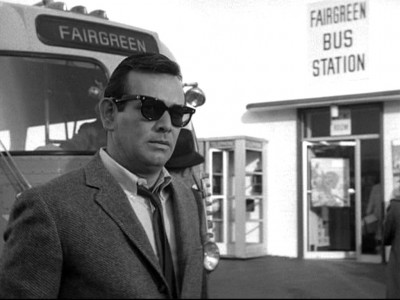
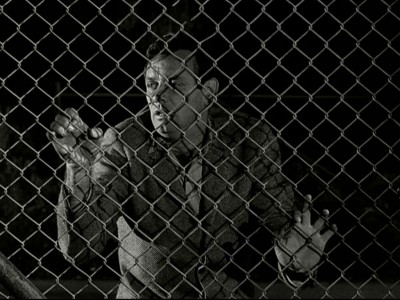
The DVD:
The Video:
The full-screen, 1.33:1 video transfers for The Fugitive: Season Two, Volume Two are as impressive as they were from the previous volumes (Corner of Hell does have some noticeable scratches at the beginning of the episode). Blacks are solid and velvety, and except for the expected grain and some scratches here and there, this is one of the sharpest looking transfers I've seen in awhile. Beautiful job again, from Paramount.
The Audio:
The restored Dolby Digital English mono mix accurately represents the original broadcast presentation, and is clear as a bell. Close-captioning is available. Of course, though, there are those substituted cues (see above).
The Extras:
Again, Paramount shows total disregard from one of the greatest TV shows ever produced, by including zero extras for this split-season set.
Final Thoughts:
The music substitutions continue, but they've been significantly cut back, with most of Pete Rugolo's underscores kept intact. As for the episodes, they're as good, or even better, than Season One. The Fugitive: Season Two, Volume Two sees more action, more tension as Dr. Richard Kimble continues to slip through his backroads American nightmare, searching for the one-armed man who murdered his wife. Yet as Kimble continues to seek him out, his survival skills become more acute - and his Midwestern geniality rapidly gets left behind. This Kimble is becoming a hardcase survivor, and it makes for a fascinating turn for the series. I highly, highly recommend this brilliant show, The Fugitive: Season Two, Volume Two.
Paul Mavis is an internationally published film and television historian, a member of the Online Film Critics Society, and the author of The Espionage Filmography.


|
| Popular Reviews |
| Sponsored Links |
|
|
| Sponsored Links |
|
|
| Release List | Reviews | Shop | Newsletter | Forum | DVD Giveaways | Blu-Ray | Advertise |
|
Copyright 2024 DVDTalk.com All Rights Reserved. Legal Info, Privacy Policy, Terms of Use,
Manage Preferences,
Your Privacy Choices | |||||||









